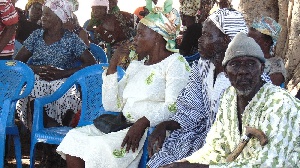 Malaria prevention awareness organised by Anglican Diocesan Development and Relief Organization
Malaria prevention awareness organised by Anglican Diocesan Development and Relief Organization
The Anglican Diocesan Development and Relief Organization (ADDRO), is engaging communities in dialogue through the use of durbars to promote evidence-based interventions for malaria prevention in the three regions of the north; Northern, Upper East and Upper West Regions in Ghana.
The dialogue durbars are part of activities under one of the organization’s new projects, dubbed Community-based Malaria Control Project (CMCP) funded by Comic Relief, a UK-based Non-profit, Non-governmental Organization.
Under the CMCP initiative, ADDRO plans to roll out about 1, 352 community malaria control dialogue durbars in the next four years in a total of 344 communities across the three regions. Malaria is hyperendemic in Ghana and the Government through the National Malaria Control Programme is working with several partners to reduce the incidences and mortality related to the disease.
The Executive Director of ADDRO, Rev. Dr. Jacob Ayeebo said ADDRO is happy to partner with government in the fight against the malaria menace in Ghana and to reduce the negative impact of the disease on productivity in the nation. “Everyone knows that malaria is one of the leading causes of deaths especially in children under five years and pregnant women.
Government alone cannot fight the menace of malaria. To this end, it enjoins us to supplement government effort in this fight. The ultimate aim of our project, therefore, is to contribute to the reduction of malaria-related morbidity and mortality” Dr. Ayeebo stated.
Community and household level activities and behaviours can be major contributors to malaria infection. Engaging communities in ways that promote exchange of knowledge and ideas could, therefore, be instrumental in helping people adopt positive lifestyles that help them protect themselves and their families from malaria infection.
The Coordinator of the Community-based Malaria Control Project, Mr. Prince Imoro Awimba said ADDRO chose to use community durbars as one of its strategies in implementing the project because of the advantages durbars have over other methods of community engagement.
“Durbars provide an opportunity for interacting with communities and finding out their knowledge about a particular subject and some of the things they are already doing. This can help you to shape your message and ideas in a way that will enable you to achieve consensus for the benefit of all the parties”. Mr. Awimba indicated. He added that, besides the general durbars targeted at reaching all community members with messages on the causes, prevention and treatment of malaria, the project also targets opinion leaders, mothers with children under-five years, caregivers and pregnant women.
“Although we target all community members when we organize a durbar, we also meet special target groups such as mothers and caregivers in smaller groups where we are able to have close interaction with them. In this way ADDRO believes it can be more effective delivering messages to help bring down malaria cases and its impact on communities, Princes included.
An interaction with participants at a recent durbar in Kongo in the Nabdam District in the Upper East Region revealed that community members find the durbars very useful as they use such gatherings as avenues for sharing ideas to help them improve their lives.
ADDRO is the development arm of the Anglican Church, Diocese of Tamale, Ghana, with its national office situated in Bolgatanga. ADDRO’s mission is to transform lives and uphold human dignity and justice for all people, irrespective of ethnicity, sex, religious or political affiliations.
The thematic areas the organization's works include; Agriculture, Food Security and Sustainable Livelihoods, Health, Environment, Governance and Peace Building, Disaster and Relief, and Water and Sanitation. ADDRO currently operates in 7 regions of Ghana.
The CMCP is being implemented in collaboration with the Ghana Health Service (GHS) in two districts each in Northern, Upper East and Upper West Regions. The project aims at reducing morbidity and mortality related to malaria through capacity building for Community Health Volunteers, staff of GHS and private health care providers to improve adherence to Testing and Treatment of malaria case management and Social &Behaviour Change Communication (SBCC).